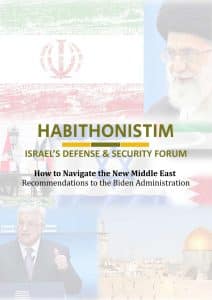
Over the past few years, and considerably during 2020, we have witnessed the reshaping of the Middle East’s traditional axes of power into four new distinct coalitions:
The Israeli – Moderate Sunni Coalition, an unprecedented overt strategic cooperation recently reaffirmed by the Abraham Accords, 2. The Shi’ite Iranian Coalition that includes Iran and its militias all across the region, including in Iraq, Syria, Lebanon, and Yemen, 3. The Radical Realistic Sunni Coalition led by Turkey, Qatar, and the Muslim Brotherhood, and 4. The Ultra-Radical Sunni Organizations, the most prominent of which are ISIS and Al Qaeda. The Moderate Sunni Arab World is now facing two existential security threats: the Iranian regime’s aggression, most notably its military nuclear program and military interventions around the region; and a growing menace posed by radical Sunni elements.
The historic détente between Israel and a large number of moderate Sunni countries, as well as the reconciliation between the Gulf States and Qatar, has been significantly stimulated by these two security threats, in addition to other common challenges such as the covid-19 pandemic and the strive for economic prosperity. Formed around an unprecedented convergence of interests, it underscores the imminence of the danger a nuclear Iran poses to the region and the international community.
In our view, the Joint Comprehensive Plan of Action (JCPOA) and its prompt lifting of economic and military pressure have proven that appeasement and containment are counter-productive in mitigating the Iranian regime’s aggression and malign activities. The limited and partial verification mechanism, the ambiguous wording, and the lack of reference to the ballistic missiles program have all led regional countries, already excluded from the negotiation process, to suspect world powers are taking the wrong path in meaningfully and sustainably encountering the Iranian threat. We underline the centrality of an efficient maximum pressure strategy in order to signal the Iranian regime that all options are on the table, including risking its domestic legitimacy, thereby obtaining peace through strength.
The Abraham Accords have also highlighted the irrelevance of past paradigms with respect to the Palestinian-Israeli conflict, preconditioning any Arab-Israeli normalization by forcing Israel into far-reaching and unsustainable security and land concessions. By circumventing this precondition and deprioritizing the Palestinian issue, moderate Sunni countries, previously instrumentalizing the Palestinian cause to put military, economic and diplomatic pressure on Israel, are now striving to leverage relations with Israel in order to strengthen their national sovereignty and security. This proves the validity of our paradigm as per the desirable path to proceed with the Palestinian-Israeli issue:
The premise that the Land of Israel, including Judea and Samaria (“the West Bank”) and the Holy Sites, is the historic and eternal homeland of the Jewish people, a place that is inseparable from Jewish identity as a religion and as a nationality.
The recognition of the necessity to strive for a sensible arrangement vis-à-vis the Palestinians, which is a continuation of the path already concluded, set, and executed in the framework of the Oslo Accords and still valid today, signed by the
Israeli Rabin Government and Yasser Arafat’s Palestinian Authority. That agreement gave the Palestinians full civil control over their population centers, setting forth a vision of a demilitarized Palestinian entity alongside the Jewish and Democratic State of Israel, with Jerusalem being its undivided capital.
The assertion, adopted by both Rabin’s government and the present-day Israeli government, that Israel has the right to defend itself by itself, along a defensible eastern border, retain control of the Jordan Valley in the broadest sense, and keep full security and military control over Judea and Samaria, based among other things on the massive civil presence of Jewish Israeli communities in the territory.
In this new Middle East, the U.S. has an important role in further promoting and consolidating the Israeli – Moderate Sunni Coalition while taking firm actions vis-à-vis Iran and the other radical forces who seek to destabilize the region and build a global network of terrorism. Now energy-independent, the U.S. has a greater margin for maneuver to lead a like-minded, interest-based coalition of regional allies to obtain sustainable peace and prosperity in the region.

